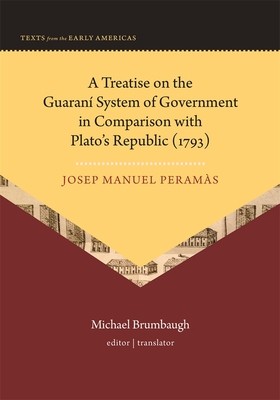
- We will send in 10–14 business days.
- Author: Josep Manuel PeramÃÂ s
- Publisher: Dumbarton Oaks Research Library & Collection
- ISBN-10: 0884025195
- ISBN-13: 9780884025191
- Format: 18.3 x 25.9 x 2.3 cm, hardcover
- Language: English
- SAVE -10% with code: EXTRA
A Treatise on the GuaranÃÂ System of Government in Comparison with Plato's Republic (1793) (e-book) (used book) | bookbook.eu
Reviews
Description
The GuaranÃÂ-Jesuit communities of greater Paraguay, in existence from 1609 until 1767, represent a unique collaboration between Indigenous and European peoples in the history of the Americas. Reports of these communities were met with fascination in Europe, as readers saw in them an opportunity to build a new political system from the ground up, one unencumbered by the entrenched norms that stymied reform in Europe. European intellectuals mythologized these communities, employing ancient Greek paradigms to characterize--and caricature--them within the context of a broader ideological conflation of antiquity and the Americas.
Josep Manuel PeramÃÂ s's De Administratione Guaranica Comparate ad Rempublicam Platonis Commentarius (A Commentary on the GuaranÃÂ System of Government in Comparison with Plato's Republic, 1793) emerges as a response to this European intellectual tradition. Written by a leading humanist scholar who lived among the GuaranÃÂ, the treatise offers a systems-level analysis of how the GuaranÃÂ-Jesuit communities were structured, interrogating formative aspects of the civic experience, such as weddings, public festivals, clothing, and political offices. In making this fascinating Latin treatise available in English for the first time, this bilingual edition offers new perspectives on the GuaranÃÂ and new avenues for exploring the complex legacy of classical literature in the Americas.EXTRA 10 % discount with code: EXTRA
The promotion ends in 20d.09:00:26
The discount code is valid when purchasing from 10 €. Discounts do not stack.
- Author: Josep Manuel PeramÃÂ s
- Publisher: Dumbarton Oaks Research Library & Collection
- ISBN-10: 0884025195
- ISBN-13: 9780884025191
- Format: 18.3 x 25.9 x 2.3 cm, hardcover
- Language: English English
The GuaranÃÂ-Jesuit communities of greater Paraguay, in existence from 1609 until 1767, represent a unique collaboration between Indigenous and European peoples in the history of the Americas. Reports of these communities were met with fascination in Europe, as readers saw in them an opportunity to build a new political system from the ground up, one unencumbered by the entrenched norms that stymied reform in Europe. European intellectuals mythologized these communities, employing ancient Greek paradigms to characterize--and caricature--them within the context of a broader ideological conflation of antiquity and the Americas.
Josep Manuel PeramÃÂ s's De Administratione Guaranica Comparate ad Rempublicam Platonis Commentarius (A Commentary on the GuaranÃÂ System of Government in Comparison with Plato's Republic, 1793) emerges as a response to this European intellectual tradition. Written by a leading humanist scholar who lived among the GuaranÃÂ, the treatise offers a systems-level analysis of how the GuaranÃÂ-Jesuit communities were structured, interrogating formative aspects of the civic experience, such as weddings, public festivals, clothing, and political offices. In making this fascinating Latin treatise available in English for the first time, this bilingual edition offers new perspectives on the GuaranÃÂ and new avenues for exploring the complex legacy of classical literature in the Americas.

Reviews